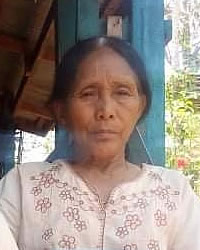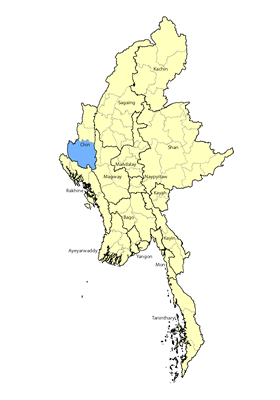Although the Asang Khongsa view themselves as a unique tribe possessing their own language and customs, until now their existence has been hidden because linguists have labeled their language a dialect of Eastern Khumi, a group with which they share only a vague connection. Despite their similar names, the Asang Khongsa are not the same as the Khongso Chin tribe who live in Sami Township. They are among the more than 60 distinct Chin groups profiled in this book.
Location: The 2,500 Asang Khongsa people inhabit two non-contiguous mountainous areas near the Myanmar-Bangladesh border. Three villages (Boiring, Boiring B and Luivang) are located in western Matupi Township, while two more villages (Yat Dain and Lar Muay Taung) are further south, east of Paletwa Township. The area is ethnically diverse, with at least six other people groups bordering Asang Khongsa territory, including the Maru, Matu, Rengca, Khumi, Likhy, and Kanise.
Language: Asang Khongsa is one of eight Tibeto-Burman varieties that linguists have classified under “Eastern Khumi” in Myanmar. The Ethnologue notes, “There is a high degree of intelligibility among the dialect groups, although they have strong attitudes against sharing the same literature.” To show their distinctiveness, the Asang Khongsa published their own Bible in 2019, as the Eastern Khumi Bible was unsuitable to them. Rakhine is commonly spoken in the towns of the region, with the Chin languages mostly used in the hundreds of communities scattered throughout the mountains.
Because of their geographic isolation and the hardships caused by years of military conflict, the Asang Khongsa are an impoverished tribe, struggling to eke out a living as subsistence farmers. During the Myanmar civil war, in November 2023 the Arakan Army targeted the town of Paletwa, finally capturing it from the government on January 15, 2024. Many refugees from Rakhine State now live in camps west of the town of Paletwa, which is only connected to Rakhine State by boat up the Kaladan River because of the impassable mountains. A road between Paletwa and Matupi townships was scheduled to be built, but progress has stopped due to the war.
Agriculture and hunting have formed the cornerstone of Asang Khongsa life for centuries. The forests of Matupi Township still contain an abundance of wildlife, including tigers, leopards, bears, pangolins, and many species of monkeys. A 19th century British officer observed: “The Himalayan bear is the animal most feared by the Chin. Although elephants trample and tigers maul them, the most difficult animal to avoid is the bear, and large numbers of the natives carry terrible wounds and disfigurements received in encounters with this animal.”
In the past the Asang Khongso were animists, enslaved by fear of demons. The Gospel began to impact them later than most other Chin groups, but a solid foundation gradually emerged. In the 1980s the Assemblies of God planted churches in the Mindat area after a local man named Tam Ki converted from animism and preached that Jesus Christ is alive and more powerful than all spirits and false gods. One day as he preached in a village, “the people plotted to shoot and kill him. The bullet, however, did not leave the barrel of their weapon. The animistic villagers were so surprised that they all submitted to the Lord.” Today, practically all Asang Khongsa people are followers of Christ.
An Asang Khongsa man who migrated to the United States was burdened by his people not having their own Bible, so he set to translate it from English in 1998. Despite finishing in 2009, a further decade elapsed before the Bible was finally printed in 2019, and another two years passed before copies could be delivered because of fighting in the area. The Asang Khongsa people were overjoyed to finally have God's Word in their language, and the spiritual lives of believers has been renewed. One 72-year-old woman had been praying 52 years for her own Bible.
Scripture Prayers for the Asang Khongsa in Myanmar (Burma).
| Profile Source: Asia Harvest Copyrighted © Used with permission |












